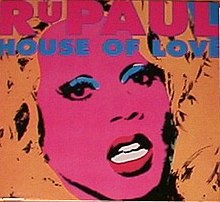
"Supermodel (You Better Work)" is a song by American dance music singer and drag queen RuPaul. It was released as a double A-sided single alongside "House of Love" on November 17, 1992 by Tommy Boy Records. The song served as the lead single from his debut major label album, Supermodel of the World (1993). The song became a dance club anthem that, though particularly popular within the gay handbag house scene, found mainstream success. The song consists of RuPaul giving advice to a young black supermodel, and briefly several other models, largely consisting of "sashay, shantay!", "work, turn to the left", "work, now turn to the right", and "you better work". The music video for the song, directed by Randy Barbato and featuring RuPaul in various outfits cavorting around New York, became a staple on MTV. Singer Kurt Cobain of Nirvana cited the song as one of his favorites of 1993, and the two were photographed together at the MTV Video Music Awards that year.
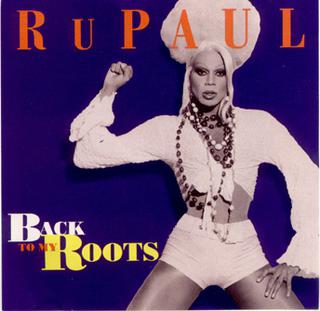
"Back to My Roots" is a song by American dance music singer and drag queen RuPaul, released as the fourth single from his album Supermodel of the World, released on April 27, 1993. Although the single failed to chart on the Billboard Hot 100, it reached number one on the Hot Dance Club Play chart in July 1993 and helped to further establish RuPaul's popularity, particularly with both the dance music and LGBT audiences in the United States.

"One Love" is a song by British electronic music act the Prodigy, released on 4 October 1993 by XL Recordings as the first single from the act's second album, Music for the Jilted Generation (1994). The song peaked at number eight on the UK Singles Chart and number five on the UK Dance Singles Chart. It was also a top 30 hit in Sweden and Switzerland.

"Get into You" is a song written by Mike Percy and Tim Lever for Australian singer, songwriter and actress Dannii Minogue's second album, Get into You (1993). It was produced by Lever & Percy and received a mixed reception from music critics. Released as the fifth single in the second quarter of 1994, it reached the top forty in the United Kingdom. Along with the single "This Is It", the song was chosen to be released in Canada and the US.

"We Are Family" is a song recorded by American vocal group Sister Sledge. Composed by Bernard Edwards and Nile Rodgers, they both offered the song to Atlantic Records; although the record label initially declined, the track was released in April 1979 as a single from the album of the same name (1979) and began to gain club and radio play, eventually becoming the group's signature song.

"Pale Movie" is a song by British pop group Saint Etienne, released in February 1994 by Heavenly Records as the first single from the group's third album, Tiger Bay (1994). The song reached number 28 on the UK Singles Charts and also became a hit in Iceland, peaking at number 24. In common with the folk music theme of the album, the song combines a Eurodance beat with Spanish folk-style guitars. The lyrics use surreal imagery to describe a man's love for a mysterious woman. Although the title is not sung, some of the words refer to cinema: "In the bed where they make love / She's in a film on the sheets. / He shows dreams like a movie, / She's the softness of cinema seats." Other lines are stranger: "her skin as white as the milk, / Just like a Sherpa Tenzing / under a Manila silk."

"You Never Love the Same Way Twice" is a song by Zambian-born singer Rozalla, released in October 1994 by Epic Records as the third single from her second album, Look No Further (1995), and later also included on her Best Of album. The song reached number 12 on the Scottish Singles Chart and number 16 on the UK Singles Chart, during a five-week chart run. It was a minor hit in Germany and Iceland, and peaked at number 61 on the Eurochart Hot 100 in November 1994. The single was also released in the United States in 1995 as the attendant single of the US edition of her second album, reaching number 11 on the Billboard Hot Dance Club Play chart. In 2005, Rozalla re-recorded and re-released the track for a German label.

"Move (You Make Me Feel So Good)" is a song by American electronic musician Moby, with a chorus sampling from Loleatta Holloway's 1980 song "Love Sensation". It was first released as the title track on Moby's extended play Move, which was issued on August 31, 1993, as his first release on Mute Records in the United Kingdom and on Elektra Records in the United States. It hit number one on the US Billboard Hot Dance Music/Club Play chart and number 21 on the UK Singles Chart.

"The Love I Lost" is a song by American R&B group Harold Melvin & the Blue Notes. Group member Teddy Pendergrass sang lead vocals. Originally written as a ballad by Philly soul songwriters Kenny Gamble and Leon Huff, the song was transformed into a funk song and features drummer Earl Young. It was released from the Black & Blue album in late 1973 and sold more than a million copies. In the 21st century, the track has been the subject of extended re-edits by notable remixers Tom Moulton, Theo Parrish, and Dimitri From Paris.

"Yesterday, When I Was Mad" is a song by English synth-pop duo Pet Shop Boys, released as the fifth and final single from their fifth studio album, Very (1993), on 29 August 1994 by Parlophone. The single, both written and produced by Neil Tennant and Chris Lowe, peaked at number 13 on the UK Singles Chart and number four on the US Billboard Hot Dance Club Play chart. The song was remixed by Jam & Spoon for its single release, among other things removing a compression effect applied to Tennant's voice during the verses. Its music video was directed by Howard Greenhalgh. One of the B-sides is a cover of the Noël Coward song "If Love Were All".

"Push the Feeling On" is a house song by the Scottish music group Nightcrawlers and American DJ Marc Kinchen (MK). The original version released in 1992 was also partially disco and acid jazz-influenced and was a minor chart hit in the United Kingdom. The song was later remixed extensively by Kinchen, creating a series of additional remixes for the song. One remix known as "Push the Feeling On (MK Dub Revisited Edit)" became an international chart hit in 1995, reaching the top 10 in various European countries, including the UK, where it peaked at number three.

"Turn On, Tune In, Cop Out" is a song by Norman Cook's acid jazz group Freak Power, released in October 1993 by Island Records and 4th & Broadway as the debut single from their first album, Drive-Thru Booty (1994). The song features a smooth jazz sound and the baritone vocals of lead singer Ashley Slater. The single originally charted at number 29 in the United Kingdom. However, two years later, the song was used in the popular Levi's advertisement "Taxi", and it was re-released on 6 March 1995. This time, the single was a success, reaching number three on the UK Singles Chart and becoming the group's only top-20 hit. The song was also a moderate hit in western Europe and New Zealand.
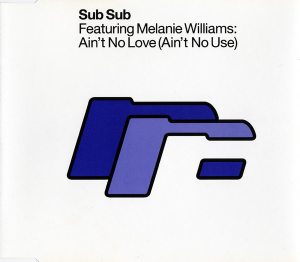
"Ain't No Love (Ain't No Use)" is a song by British dance music act Sub Sub, released on 29 March 1993 by independent label Rob's Records as the second single from their debut album, Full Fathom Five (1994). It features Temper Temper's Melanie Williams on vocals. The song was the act's biggest single, reaching number three on the UK Singles Chart and number one on the UK Dance Singles Chart; it became one of many dance singles in 1993 to cross over into mainstream popularity in the UK. In the accompanying music video, Jimi Goodwin plays bass, Jez Williams plays keyboards and percussion, and Jez' twin brother Andy Williams plays keytar. After struggling to repeat the success of the single, and after a fire destroyed the band's Ancoats studio in 1996, the group eventually reformed with a radically different sound as Doves in 1998.

"Melody of Love (Wanna Be Loved)" is a song by American singer and songwriter Donna Summer. It was released on October 31, 1994 by Mercury Records and Casablanca Records as a new track and the lead single for her 1994 hits compilation album, Endless Summer: Donna Summer's Greatest Hits. The song was written by Summer, David Cole, Robert Clivillés and Joe Carrano, and produced by Summer and Welcome Productions. It just missed the top 20 in the United Kingdom and was a top-40 hit in Belgium. The song was formed with several remixes and was her tenth number one hit on the US Billboard Hot Dance Club Songs chart. In Australia, the single peaked at number 79 in December 1994. It was awarded the ASCAP Dance Song of the Year prize in 1996.

"Let It Rain" is a song by English pop boy band East 17, released on 13 March 1995 by London Records as the fourth single from their second album, Steam (1994). It was written by Ian Curnow, Phil Harding and Rob Kean with bandmember Tony Mortimer, while Curnow, Harding and Kean produced the song. It reached number one in Lithuania and Israel, and the top 10 in Finland, Ireland and the UK. Additionally, it was a top-20 hit in Australia, Ireland, the Netherlands, and Norway.
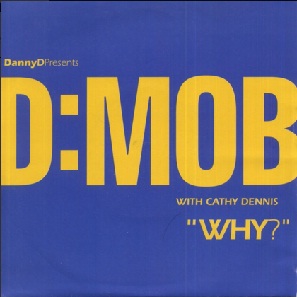
"Why" is a song by British music producer and remixer D Mob featuring singer-songwriter Cathy Dennis. It was released by FFRR as the fourth single from Dennis's second album, Into the Skyline (1992), a full year after her previous single from the album. In the UK, it reached number 23 on the UK Singles Chart, number seven on the UK Dance Singles Chart and number one on the UK Club Chart, making it the most successful single from the album. "Why" was dedicated in memory of Philip Hall, who died in December 1993.
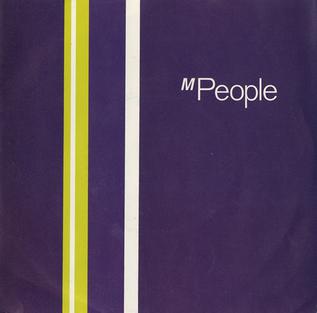
"How Can I Love You More" is a song by British band M People, released as the first single from their debut album, Northern Soul (1991). The song was written by band members Mike Pickering and Paul Heard, and produced by M People. It was first released in October 1991 by Deconstruction Records, peaking at number 29 on the UK Singles Chart. Then it was re-released on 25 January 1993 by same label with several new remixes, this time becoming a bigger hit, peaking at number eight on the UK Singles Chart.

"Give It to You" is a song recorded by American singer-songwriter Martha Wash and the second release from her self-titled debut album, Martha Wash (1992). The song is the follow-up single to "Carry On", and is written and produced by Brian Alexander Morgan. Released in January 1993 by RCA Records, it would be her second number-one single on the US Billboard Dance Club Songs chart, reaching the top spot on April 3, 1993. It also became a modest crossover hit on the Billboard Hot 100 and Cash Box Top 100, peaking at numbers 90 and 91, same year. The music video for "Give It to You" was directed by German director Marcus Nispel, featuring Wash performing in a castle, surrounded by shirtless male dancers.

"U R the Best Thing" is the debut single of Northern Irish musical group D:Ream, included on their first album, D:Ream On Volume 1 (1993). Originally a club hit released in 1992, the song has been remixed and re-released twice: in 1993 and in 1994. The 1994 version, also known as the Perfecto mix, was most successful peaking at number three in Scotland, number four on the UK Singles Chart and number six in Ireland. It also peaked at number 13 on the Eurochart Hot 100. The 1993 version reached number one on the Billboard Hot Dance Club Play chart in the US. There were made three different music videos to promote the single; the 1994 version was directed by Marcus Nispel.

"Light My Fire" is a song by Italian musical group Club House, featuring Italian-American singer Carl Fanini, released as the second single from their debut and only album, Nowhere Land (1995), in August 1993. It was co-written by a number of producers at Media Records, including Gianfranco Bortolotti and Mauro Picotto, a DJ who would go on to have a number of trance hits in the 2000s, such as "Lizard" and "Komodo".
